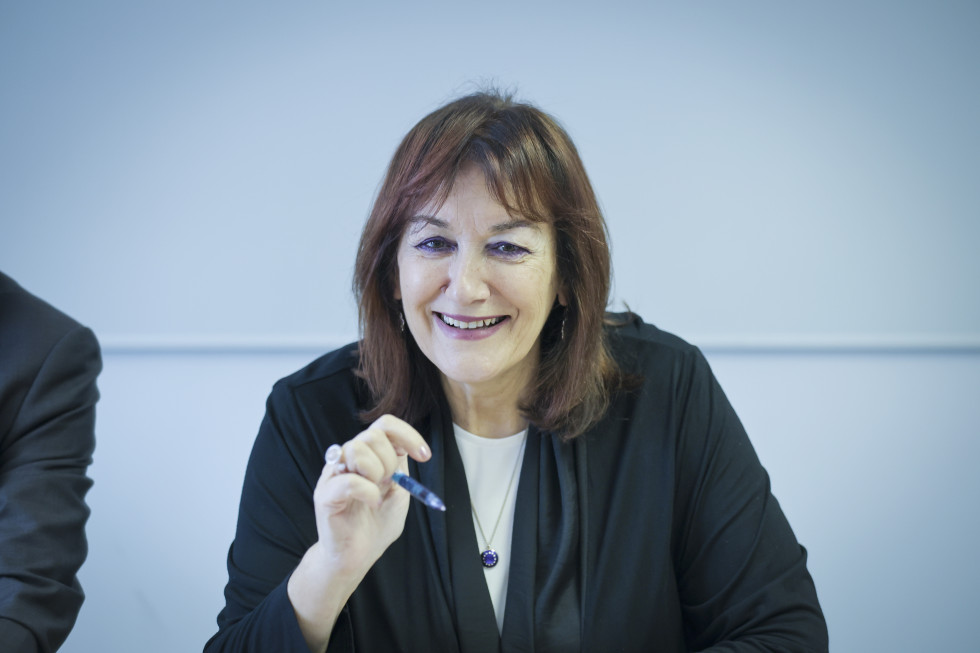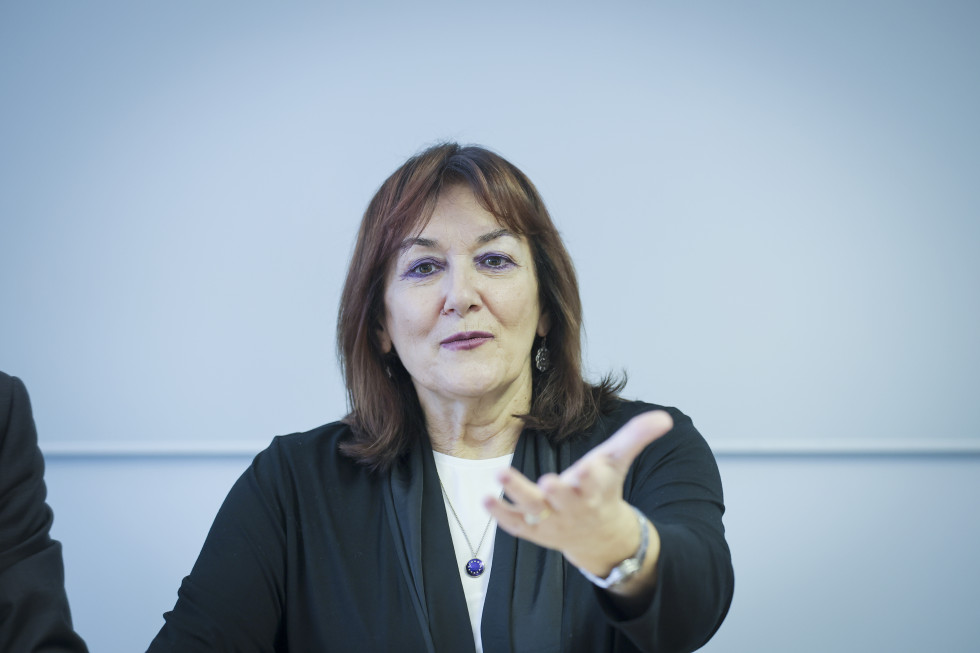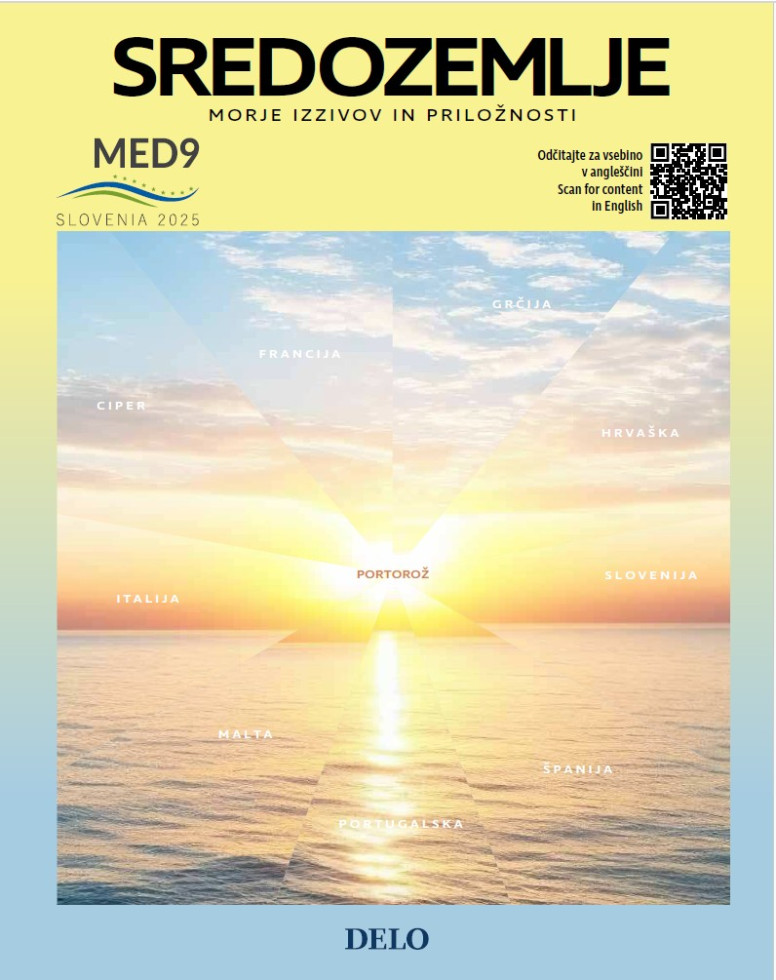We want to be players, not just payers, in global affairs
Both Slovenia and Croatia have a particular responsibility and opportunity to include the reality of our region in the European discussion. Because they understand the complex intertwinement of geography, history and culture, as a result of which the Mediterranean represents a crossroads and a strategic border.
You come from Dubrovnik, a historical seaside town in the heart of the Mediterranean, of which you were also mayor. How has this personal experience influenced your view on the challenges and opportunities occurring in the Mediterranean region?
While it is true that the Mediterranean region faces many challenges, it also offers great opportunities. Stability in the Mediterranean is essential for growth and prosperity. We aim to strengthen its resilience. Our shared leverage and influence are the strongest if we work together. My path has a significant impact on how I approach this mission. I come from Dubrovnik – a historical town that has survived the ravages of war, was reborn with the help of resilience and thrives today as part of one of the most ambitious projects of regional development in the EU. I feel a deep connection with this task. As a former mayor, I know what it means to be close to the people and deal with their problems directly. You see first-hand how policies shape everyday lives. I experienced the fragility of war and the promise of peace and saw how cross-border connections can bring about prosperity and stability. My personal history reminds me every day that behind strategies and policies there are people – families, communities, citizens. Their trust must be earned and their future depends on our ability to achieve results. That is what guides me in my role as Commissioner.
I experienced the fragility of war and the promise of peace and saw how cross-border connections can bring about prosperity and stability.
As Mediterranean EU Member States, Slovenia and your homeland Croatia bring unique views on both the MED9 and the broader Mediterranean policy of the Union. In what way do you think these two countries can become more actively involved in the development of EU approaches in the region?
Both Slovenia and Croatia have a particular responsibility and opportunity to include the reality of our region in the European discussion. Because they understand the complex intertwinement of geography, history and culture, as a result of which the Mediterranean represents a crossroads and a strategic border. Their contribution can be very tangible: building bridges between north and south, advocating for stronger regional cooperation, promoting connectivity with infrastructural and energy projects and facilitating sustainable development. They also have a role to play in enhancing security – by supporting efforts to eliminate instability, illegal migrations and hybrid threats. At the same time, they both carry the historical experience of conflicts and the living memory of how working together in solidarity can turn challenges into opportunities. This gives them, or rather us, a unique voice in the Union – and shows that investing in peace, partnership and resilience pays off. By integrating this approach in the EU’s Mediterranean policy, they can help shape the region as a place of opportunity, investment and prosperity that strengthens Europe as a whole.
The Mediterranean is a strategic crossroads for Europe. How does the European Commission see the region’s role in the context of the EU’s broader geopolitical and economic priorities?
Ensuring prosperous and stable southern Mediterranean is at the forefront of EU’s actions. Establishing this portfolio shows that the region has regained its importance for the EU. Today’s adoption of the Pact for the Mediterranean, 30 years after the beginning of the Barcelona Process, reinforces our partnerships to establish a truly common Mediterranean area. This pact is the right way forward in times of great geostrategic and economic uncertainties. Challenging times are also an opportunity to increase our resilience, strengthen our geopolitical role and deepen ties with our closest partners. This is our strategic approach. This Commission sees its work from the perspective of stronger cooperation, competitiveness and security for all – for the benefit of our citizens and our economies. We want to be players not only payers in global relations. Let me remind you that the EU represents approximately 16% of the global GDP but provides more than 42% of global aid. The Pact for the Mediterranean opens a new chapter for wider and stronger collaboration based on historical and cultural ties that connect us.
Prosperity, stability and security go hand in hand – one cannot be achieved without the other.
What is the vision of the new Pact for the Mediterranean and how can MED9 help ensure that the Mediterranean countries’ priorities are better represented in the EU’s policy-making?
The pact provides a new political framework for overcoming our common challenges – from security threats and illegal immigration to climate change and the energy transition, as well as economic opportunities at sea – with a coordinated, integrated and mutually beneficial approach. It differs from past initiatives in the way it was developed: in cooperation with our Mediterranean partners, backed with concrete measures and management mechanisms ensuring accountability and implementation. MED9 has a crucial role to play in this process. As a group of Mediterranean EU Member States, it can ensure that Mediterranean perspectives are treated as European priorities. For example, advocating for policies aimed at strengthening resilience, competitiveness and connectivity. MED9’s active involvement can ensure that the pact brings results – that our historical and cultural ties become the driving force of stability, innovation and prosperity for all.
The Mediterranean is one of the global hotspots for climate change. What are the EU’s priorities to help the region adapt to climate change while preserving biodiversity and ensuring the sustainable use of resources, such as water and fishery resources?
The Mediterranean is one of the global hotspots for climate change, as it is warming 20% faster than the global average. The urgency to act is therefore clear: common climate challenges require common solutions. Our Mediterranean partners are indispensable on Europe’s path to climate neutrality. Having the biggest solar and wind energy potential in the world, they are essential to increasing the use of sustainable energy in a cost-effective and strategic manner. The pact will increase cooperation in climate resilience, renewables, water management and biodiversity protection. This means promoting trade in renewable energy, strengthening mutual connections and supporting clean technologies while protecting key resources, such as water and fishery resources. But this is more than a climate policy, it is a socio-economic transformation. Investments in renewable sources of energy and infrastructure reduce dependence, increase stability and create jobs.
Migratory pressures remain a challenge for the EU and its Mediterranean partners. What approaches are you considering to better balance border management, promote legal pathways and deepen cooperation with countries of origin and transit countries?
Migration management and security are the main priorities of the pact. It will implement the external dimension of the EU’s migration policy by strengthening cooperation with partner countries in border management, voluntary return, readmission, reintegration and security. The objective is a comprehensive, partnership-based approach throughout that promotes stability, creates opportunities and ensures humane and effective management. North African countries are not only points of origin, but also transit and destination points. Migration can therefore be managed effectively only in the form of shared responsibility. The key pillars of this approach include the prevention of illegal migration by combating smuggling, effective return and reintegration and the spread of safe and legal skill and mobility pathways. At the same time, it is crucial to consider the main causes of illegal migration and forced displacement. By investing in our southern neighbours and supporting tailored training, we strive to create jobs, develop skills and competences, and increase labour mobility by legal pathways.
The region has assumed a key role during the recent energy crisis, as the EU helped diversifying supply and strengthening energy security at a time when it desperately needed it.
The Mediterranean has great potential for renewables and connectivity. How can MED9 act in strengthening Europe’s energy resilience while promoting the region’s competitiveness?
The abundance of sun, wind and potential off-shore resources makes the Mediterranean one of the most promising regions in the world in terms of renewables. Energy cooperation with our southern Mediterranean partners has incredible potential for common growth as well as security. The region has assumed a key role during the recent energy crisis, as the EU helped diversifying supply and strengthening energy security at a time when it desperately needed it. This cooperation supports our transition targets by ensuring transition energy sources, such as natural gas, while setting the foundations for future clean energy partnerships. The pact will promote a future-oriented collaboration, including projects such as the SouthH2 Corridor, new electrical connections and liquefied natural gas infrastructure. Strengthening cooperation will allow us to transition to a more resilient and climate-neutral energy system. Our goal is mutual benefit: ensuring affordable and safe energies by releasing private investments and regional projects that support decarbonisation and create new opportunities, particularly for young people.
Young people form a large part of the Mediterranean population. How do you see the role of strengthening democratic life and stability in the region through youth education, skill development and participation?
Young people are a clear priority in my portfolio. They wish to freely express their opinions and shape the way they participate in society, as highlighted in the global youth participation index. From the experience obtained as a teacher and politician, I know that gaining their trust and involving them in policy-making in a meaningful way are of fundamental importance, particularly when considering various demographic trends. That is why the pact places a strong emphasis on interpersonal connections, especially for young people. Young people are one of our most precious assets, and it is essential that we shape the future with them, not only for them. There are many different ways that we can do this.
At the Forum on the Future of the Mediterranean in Granada, I presented the idea about a Mediterranean youth parliamentary assembly to enable young people to assume responsibility and shape the pact. The pact will also lay the foundations for establishing the Mediterranean University initiative. It will allow students and scholars in the region to connect, collaborate and develop innovations together. In addition to education and exchange, the pact will focus on job creation. We want to unlock the potential of the generation that wishes to contribute to a common and successful future.
The conflict in the Middle East has profound consequences for the Mediterranean and Europe. How can the EU contribute to de-escalation, stability and renewed dialogue in the region while supporting the affected communities?
keyke We seek long-lasting peace and resilience in the Mediterranean. This depends on closer cooperation, economic opportunities and inclusive management. Although the pact is not directly aimed at resolving the Israeli-Palestinian conflict, it considers numerous root causes of instability. By creating the space for dialogue, investment and mutual trust, we can contribute to a more stable environment in which political solutions become achievable. A special emphasis is placed on young people, as we are responsible for securing a better future for them. We cannot afford to see the region as a set of isolated crises. The pact represents a shift from a reactive approach to a positive, common programme in the service of Mediterranean countries and Europe. A more connected and resilient Mediterranean is in everyone’s interest – it contributes to peace and stability in the Middle East, which the pact will help implement.
My personal history reminds me every day that behind strategies and policies there are people – families, communities, citizens.
What do you think about Trump’s 20-point Gaza peace plan?
We welcome the 20-point Gaza peace plan. We continue to strive for peace in the Middle East. Centring on a cease-fire, the release of all Israeli hostages and the emergency delivery of humanitarian aid form a constructive basis for relieving suffering on the ground in the short run. Achieving demilitarisation and effective transitional management in Gaza is essential and will require careful coordination. The EU is prepared to contribute to these efforts. Our involvement as part of the Palestine Donor Group will be essential, together with our regional partners, including from the Gulf countries. The EU has helped prevent the situation in the West Bank from escalating by averting the collapse of the Palestinian Authority. We are prepared to assist in the recovery of the Palestinian economy in Gaza and the West Bank, and reconstitution on the first day after the cease-fire. We will also continue to support the two-state solution. Drawing a clear political horizon for the Palestinians is essential to the successful implementation of the plan.





